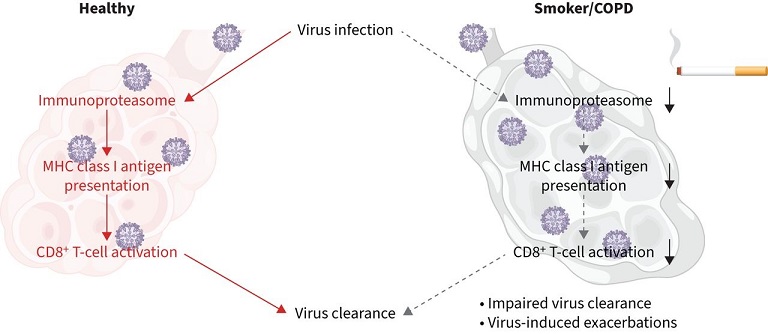Immunology News: International Study Finds That CD8+ T-cell Antiviral Immune Responses Are Impaired By Cigarette Smoke And In COPD
Thailand Medical News Team Aug 14, 2023 1 year, 8 months, 6 days, 10 hours, 9 minutes ago
Immunology News: Chronic Obstructive Pulmonary Disease (COPD) is a severe respiratory condition characterized by progressive airflow limitation and damage to the lung's delicate alveolar structure. With a global prevalence exceeding 10%, COPD stands as a major health concern, ranking as the third leading cause of mortality worldwide. Unsurprisingly, tobacco smoke consumption emerges as a significant risk factor for COPD development, amplifying the urgency to unravel the intricate interactions between environmental factors, immune responses, and lung health.
 Main findings of the study. Cigarette smoke impairs virus-induced upregulation of the major histocompatibility complex (MHC) class I antigen presentation machinery resulting in reduced activation of antiviral CD8+ T-cells
Main findings of the study. Cigarette smoke impairs virus-induced upregulation of the major histocompatibility complex (MHC) class I antigen presentation machinery resulting in reduced activation of antiviral CD8+ T-cells
Viral infections, notably by pathogens like rhinovirus and influenza A virus (IAV), play a crucial role in exacerbating COPD symptoms and accelerating disease progression. These infections trigger a cascade of immune responses, with a key focus on the activation of specialized immune cells known as cytotoxic CD8+ T-cells as shown in previous studies and
Immunology News reports. These cells are adept at recognizing and eliminating virus-infected cells, acting as a vital defense mechanism against viral invaders.
Remarkably, the significance of CD8+ T-cell activation has been underscored in recent times, particularly in the context of the COVID-19 pandemic where compromised T-cell responses have been associated with severe disease outcomes.
In this context, a comprehensive international study led by the Institute of Lung Health and Immunity, Helmholtz Zentrum München-Germany and other prominent research institutions sheds light on a critical aspect of COPD pathogenesis.
The study uncovers a detrimental connection between cigarette smoke, impaired antiviral immune responses, and COPD susceptibility.
The study delves into the intricate mechanisms governing CD8+ T-cell activation and its suppression by cigarette smoke, offering vital insights into how this detrimental habit exacerbates the vulnerability of smokers and COPD patients to viral infections.
At the heart of this investigation lies the immunoproteasome, a specialized cellular machinery responsible for generating viral antigenic peptides that are crucial for CD8+ T-cell recognition. These peptides are presented on the surface of virus-infected cells in conjunction with major histocompatibility complex (MHC) class I molecules, serving as a "molecular fingerprint" that guides CD8+ T-cell responses.
The study meticulously dissected the effects of cigarette smoke on this essential process, employing a multidimensional approach that spanned in vitro experiments using mouse cell lines, ex vivo lung cultures, in vivo mouse models, and primary human cell analysis. The study also leveraged clinically relevant viruses, including influenza A virus and HRV-16.
The study findings revealed a sobering reality - cigarette smoke hampers the induction of the immunoproteasome b
y both cytokine signaling and viral infections across various models.
The repercussions of this impairment extend further, manifesting as altered MHC class I antigenic presentation - a vital step in priming CD8+ T-cell responses. The immunopeptidome, the collection of antigenic peptides displayed by MHC class I molecules, underwent significant remodeling in the presence of cigarette smoke. This profound reshaping of the immune landscape underscores the intricate interplay between environmental factors and immune system functionality.
Perhaps the most striking aspect of the study is its direct relevance to COPD patients. Clinical investigations demonstrated that individuals afflicted with COPD exhibited diminished numbers of influenza-specific CD8+ T-cells in their peripheral blood when compared to healthy controls and even asthma patients. This observation reinforces the notion that defective antiviral immunity, compounded by impaired CD8+ T-cell responses, contributes to the heightened susceptibility of COPD patients to viral infections.
While the study provides compelling evidence of cigarette smoke's detrimental effects on immune responses, it also raises broader questions about the broader implications of these findings. Could the compromised antiviral CD8+ T-cell responses serve as a potential catalyst for COPD development, creating a vicious cycle of chronic inflammation and tissue damage? The study's authors speculate on this possibility, suggesting that the ineffective clearance of viral infections due to flawed CD8+ T-cell immunity might contribute not only to acute exacerbations but also drive the chronic progression of COPD.
However, it's worth noting that the study's small sample size calls for cautious interpretation of the findings. The incorporation of control groups, including healthy individuals and asthma patients, bolsters the robustness of the conclusions. Yet, as the study acknowledges, further research is needed to comprehensively explore the implications of altered MHC class I antigen presentation in COPD exacerbations - a field that has been relatively understudied until now.
In conclusion, the groundbreaking research sheds light on the intricate mechanisms underlying impaired antiviral immune responses in COPD patients, offering a new dimension to our understanding of the disease's pathogenesis. By unraveling the link between cigarette smoke, immunoproteasome dysfunction, and compromised CD8+ T-cell activation, the study underscores the pressing need for public health measures aimed at curbing tobacco consumption. As the global burden of COPD continues to rise, innovative strategies to boost antiviral immune responses and mitigate the impact of viral infections could pave the way for improved management and treatment of this debilitating condition.
The study findings were published in the peer reviewed European Respiratory Journal.
https://erj.ersjournals.com/content/62/2/2201374
For the latest
Immunology News, keep on logging to Thailand Medical News.
